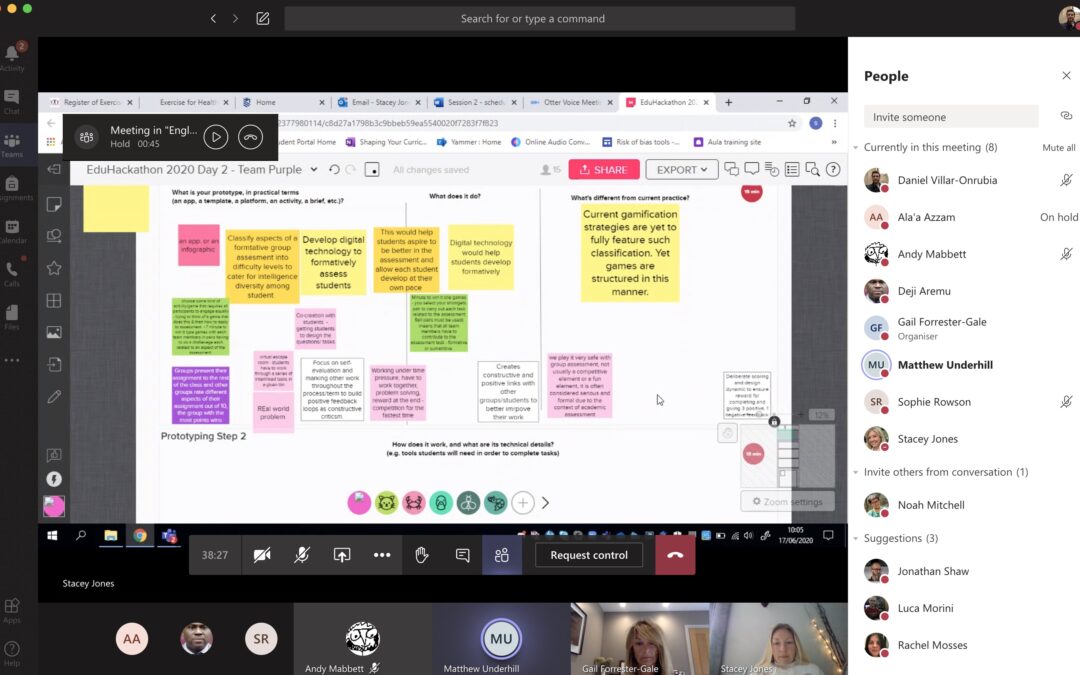This summer, in the context of the Erasmus + project EduHack.eu, we organised the Coventry EduHackathon 2020 – co-hosted by the Disruptive Media Learning Lab and the Global Education, Learning and Attainment Research Centre.
Eduhackathons can be defined an intensive, focused, collaborative and hands-on events aimed at devising approaches and/or resources that address some key educational issues or challenges. In this case, the aim was to innovate in the design of Collaborative Learning experiences and Group Assessment, making sure technology is used effectively to make assessment more meaningful and valuable to students. Group work and assessment have proved to be challenging in many disciplines and in the context of a post COVID-19 world – where online and blended learning are not just important but essential – a whole new range of considerations require careful attention.
The EduHackathon took place online – combining Microsoft Teams and Mural.co – and it was split into two separate 3-hour sessions, enabling educators to envision tangible solutions to the overall challenge by following a structured approach based on design thinking principles. A preliminary webinar covered the initial stages of the design thinking process and facilitators from various units (Academic Development, Curriculum 2025, DMLL and GLEA) offered guidance during ideation and prototyping stages to three separate groups.
The three assessment ideas produced as a result of the EduHackathon were refined over the following weeks and presented to a panel of experts at the Coventry Teaching & Learning Conference on the 15th of July:
Developing Authentic Online Group Assessment
Problem Identified: It is challenging to engage students from a range of cultural, linguistic and educational backgrounds to participate and present in groups online. This is important to rectify as online pedagogy is the future of their profession as English teachers. We want to develop teaching and assessment to support our students in this respect, and ensure that students can engage with online teaching and assessment effectively.
Solutions Proposed:
- Action-research driven rubric co-creation with students
- Focus groups to better understand students’ needs
- Training and scaffolding from the beginning of the course
See further details on this Sway.
Team Contributors:
- Zoe Gazeley-Eke
- Marina Orsini
- Andrew Preshous
- Sarah Turner
- Benet Vincent
CLAW – CU LEARNING AND ASSESSMENT WIKI
Problem Identified: The assessments do not offer enough detail to be clearly understood by individuals holding different expectations (both academics and students).
Solution Proposed: Actively engage students in the assessment and feedback process by developing a learning partnership between academics and students. This will be done by co-creating a digital resource on assessment literacy, i.e. CU Learning and Assessment Wiki (CLAW)
See further details on this Adobe Spark presentation.
Team Contributors:
- Asima Iqbal
- Alexandra Petre
- Tanya Vidanagama
- Elliot Pfebve
- Ruth Reader
Escape Rooms – A Revolution In Group Assessment
Problem statement: Our teams focused on innovating group assessments. Typically 50% of a module so it’s important we get this right. Ideally group work can assess for lots of different skills, however students often complain of unequal work. Especially with Covid-19 and a large cohort of international student, asynchronous activities have limited engagement power.
Solution: Escape rooms can make group work collaborative and engaging in a virtual environment. This tool is very versatile, interdisciplinary, inter-professional and can be applied at all levels from 4-7.
Team members:
- Ala’a Azzam
- Matthew Underhill
- Deji Aremu
- Simran Basi
- Vani Aul
- Andy Mabbet
Background information, relevant resources and further details about participants is available on this SPOT site: https://coventry.eduhack.eu
As part of the EduHack.eu project, we have also facilitated a series of online Continuous Professional Development (CPD) activities and hosted a campus-based EduHackathon in 2019, focusing on Authentic Assessment.
Another output of the project released recently is a Domain of One’s Own kit enaling you to learn about and practice your domain building skills. Each kit is an activity that will provide you with the instructions and materials necessary to put in your domain a blog, a wiki, a stand alone web site, a file dropbox, a photo gallery, and more.

